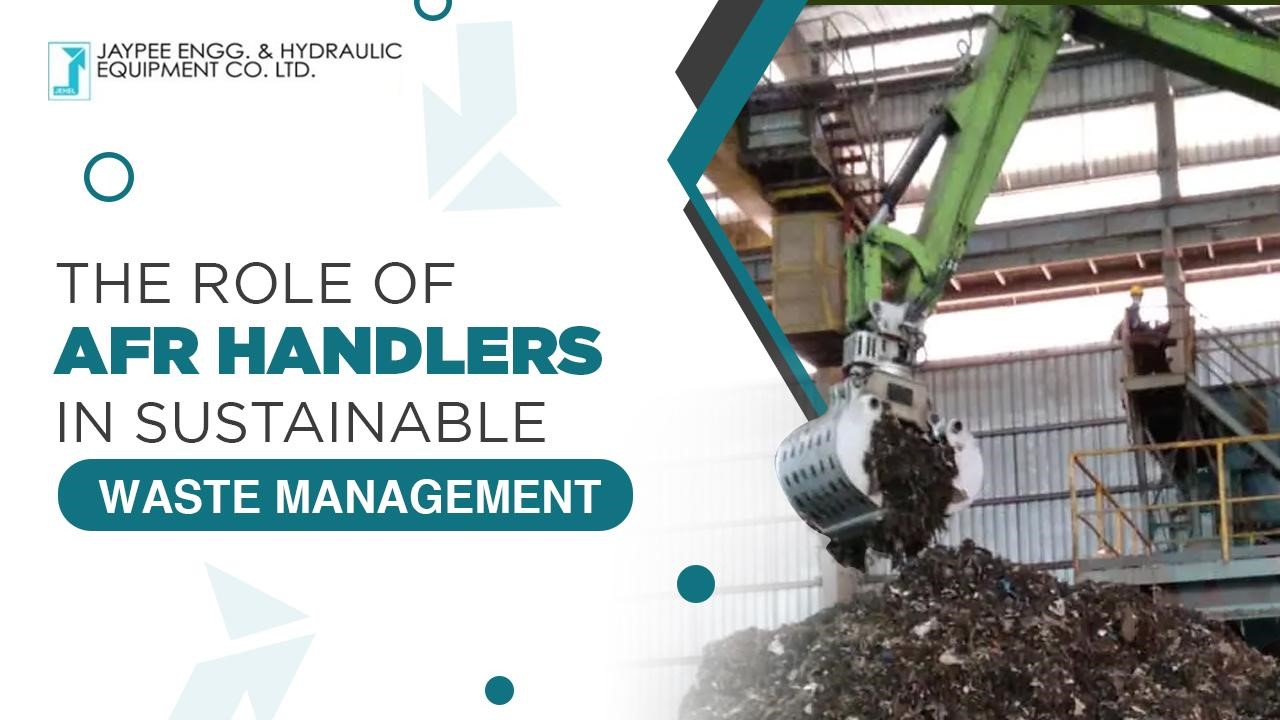Imagine this – millions of tonnes of waste that previously occupied landfills now fuel cement kilns and cut carbon emissions. This is not a far-off prospect—this is happening now with the help of AFR handlers. These machines are working behind the scenes to revolutionize the way industries manage waste, converting what was previously regarded as rubbish into valuable fuel and raw material.
Global industries deal with an increasing number of challenges every day. As energy prices rise and environmental laws become more stringent, mountains of garbage accumulate. What if both issues could be resolved simultaneously, though? What if the problem was waste, and waste became the solution? For astute companies worldwide, this ground-breaking strategy is already altering the rules.
What are AFR Handlers and Why Do They Matter?
AFR is an acronym for Alternate Fuel and Raw materials. AFR handlers are high-tech material handling machinery specifically engineered to transport, and handle waste materials that can be recycled into alternative fuels. AFR handlers play a critical role in the circular economy by assisting industries in reducing their fossil fuel dependence and resolving waste disposal issues.
The idea is ingenious but straightforward. Rather than dumping trash into landfills, AFR handlers gather and process items such as plastic refuse, paper, textile material, and biomass. These are then turned into Refuse Derived Fuel (RDF) that is capable of substituting conventional fossil fuels in cement factories and power stations.
The Need for More Sustainable Solutions Grows
Recent information by the UN Environment Programme indicates that waste management globally may reach as much as USD 270.2 billion by 2050 if trends persist. This, however, can be minimized by utilizing circular economy models through efficient waste handling. It is at this point that the AFR handling boom comes in handy for industries globally.
The AFR handlers market has expanded significantly, reaching USD 244.29 billion in 2024 and is projected to reach USD 445.81 billion by 2034. This growth demonstrates the rising demand for effective waste processing technology, with AFR handlers at the forefront of this change.
How AFR Handlers Work in Practice
AFR handlers employ advanced hydraulic systems and grabs to sort, gather, and process various kinds of waste materials. These devices are capable of handling a wide variety of materials, such as:
- Municipal solid waste
- Industrial waste
- Biomass material
- Waste plastic and paper
- Textile waste
The equipment has substantial breaking loads and chains that can process a wide range of materials. Businesses from various industries are implementing these solutions to minimize their environmental impact while decreasing their operational costs.
Advantages of Utilization of AFR Handlers
The use of AFR handlers brings a host of operational, environmental, and cost benefits that make them a wise choice for modern industries:
- Impacts on the Environment
By recycling waste into alternative fuel, AFR handlers reduce landfill burden and lower greenhouse gas emissions. The process encourages a circular economy where waste is a valuable resource as opposed to a disposal issue.
- Cost Reduction
Industries operating on alternative fuels via AFR handling systems save their fuel expenses by as much as 30-40% over the use of traditional fossil fuels. This is a sound business decision that aligns with environmental objectives.
- Regulatory Compliance
With increasingly stringent environmental regulations around the globe, AFR handling ensures companies comply with waste management standards and carbon emission targets.
The Technology Behind Modern AFR Systems
- Modern AFR handling equipment makes use of state-of-the-art technology, such as:
- Sophisticated hydraulic systems for accurate material handling
- Automated sorting systems
- Real-time monitoring systems
- Energy-saving operations
Tailor-made solutions for various waste types
The AFR handling boom is propelled by advancements in technology that are making these systems more efficient and cost-saving than ever before.
AFR Revolution Leading Industries
Several industries are adopting AFR handling solutions:
Cement Industry
Pioneering by utilizing RDF as a substitute fuel in kilns, diminishing coal use by considerable quantities
Power Generation
Generating electricity through the use of processed waste materials while minimizing the use of fossil fuels
Manufacturing
Converting their industrial waste into valuable fuel sources for their companies
Waste Management Companies
Providing AFR processing services to industries and municipalities
Manufacturers with AFR handling systems achieve staggering outcomes. Specific cement factories replaced as much as 25% of their conventional fuel with reprocessed waste materials. Not only does it save money, but it also assists in the realization of sustainability goals.
The AFR handling boom is very prominent in the Asia Pacific, which holds 41.2% of the market for material handling equipment. India and China are among the countries that are heavily investing in these technologies to meet their increasing waste management issues.
Challenges and Solutions
Although AFR handling has numerous advantages, having these systems installed takes foresight:
– The initial cost of investment can be high
– There needs to be staff training for the system to function properly
– Ensures consistent fuel qualities
– There are regulatory approval procedures to be followed
Yet, firms such as JEHEL Hydraulics offer end-to-end solutions to these problems through skilled engineering, dependable service, and competitive prices.
Future Trends in AFR Handling
The future of AFR handling technology is bright. Experts foresee steady growth fueled by:
– Tighter environmental regulations
– Increased cost of fossil fuels
– Enhanced technology efficiency
– Increased recognition of circular economy advantages
Automation and data analytics are also making AFR systems more innovative and more efficient, with improved material processing and sorting ability.
Conclusion
The waste crisis requires creative solutions, and AFR handlers are responding with unprecedented success. These machines are not just equipment—they’re instruments for creating a sustainable tomorrow where waste is wealth and environmental stewardship is key to business success.
As businesses globally are under increasing pressure to lower their environmental footprint, AFR handling systems provide a real-world solution. They shift waste management from being a cost centre to being a value creator, yesterday’s disposal issues becoming tomorrow’s fuel solutions.
The AFR handling boom is just getting started. As global waste production is likely to grow by 70% by 2050, the demand for effective AFR systems will expand accordingly. Those companies that invest in these technologies now are setting themselves up as leaders in tomorrow’s sustainable economy.
JEHEL Hydraulics has been leading material handling solutions since 1995, with three decades of engineering superiority coupled with leading-edge technology. Our AFR handling systems do not merely handle waste—they generate value, save costs, and conserve the environment.
Don’t let waste weigh down your operations and the earth. Collaborate with JEHEL to introduce AFR handling solutions that transform your waste into wealth. Our experienced engineers offer personalized solutions, trustworthy support, and favourable pricing that make eco-friendly waste management both functional and lucrative.
Call JEHEL today and become part of the AFR revolution. Your future—and our future—hangs in the balance.
Frequently Asked Questions About AFR Handlers
1. What are AFR handlers used for?
AFR handlers are used to collect, handle, and process waste materials such as plastics, biomass, paper, and textiles into alternative fuel and raw materials.
2. What does AFR stand for in waste management?
AFR stands for Alternate Fuel and Raw materials, which are waste-derived materials used to replace fossil fuels in industries like cement and power generation.
3. How do AFR handlers support sustainable waste management?
AFR handlers reduce landfill waste, lower greenhouse gas emissions, and promote a circular economy by converting waste into valuable fuel resources.
4. Which industries use AFR handling systems?
Industries such as cement manufacturing, power generation, waste management, and industrial manufacturing widely use AFR handling systems.
5. What types of waste can AFR handlers process?
AFR handlers can process municipal solid waste, industrial waste, biomass, plastic waste, paper waste, and textile materials.
6. Do AFR handlers help reduce operational costs?
Yes. Industries using AFR systems can reduce fuel costs by 30–40% while lowering waste disposal expenses and regulatory compliance costs.
7. Are AFR handlers compliant with environmental regulations?
Modern AFR handling systems are designed to meet strict environmental and waste management regulations, helping industries achieve emission and sustainability targets.
8. Why choose JEHEL for AFR handling solutions?
JEHEL offers customized AFR handling systems, advanced hydraulic technology, reliable after-sales support, and decades of engineering expertise.


